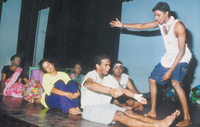| Mirror
Magazine |
||||
| A
taste of papadam An adaptation of Indian author Mahasveta Devi’s two short stories ‘Urvashi and Johnny’ and ‘The Poet’s Wife’, this play was reproduced with a Lankan flavour, as ‘The Jony and Urvashi Show’ and ‘The Blind Poet’ and rewritten by Ruwanthie de Chickera. Presented by the University of Colombo and the Stages Theatre Company, ‘a poet, a puppet and papadam’, came alive last weekend at the Lionel Wendt Theatre. One vital aspect of a drama that is often overlooked by audiences and critics alike, are the minor characters. This time they just couldn’t go unnoticed, for they were fabulous! At any given time during this two-and-a-half hour production, if one were to observe them in the background, never did they stray from their allotted role. Be it lovers under an umbrella, a pervert, nurses, patients, an MC dude, an aimlessly wandering mad woman, or a cross dresser… nobody seemed to have taken their roles lightly. From the brilliant portrayals of the ‘leads’ to the most minor character, these young, talented artistes gave a splendid performance. The sensitive and heart-wrenching portrayal of the ventriloquist street performer Jony (Dayan Ranasinghe) was complemented in every imaginable way by his counterpart cum puppet Urvashi (Imani Perera). Dayan captured the essence of the street performer and his passion for his show held at the Borella bus depot every evening. Although it was the same people everyday listening to the same old jokes, it was mutually beneficial to both parties. For his audience, it was their only means of entertainment and for Jony, it was his life. Watching Urvashi prance about stage was a treat! The amazing rapport she had with her ‘creator’ Dayan was the key to their success. As Urvashi says, “you are who we are, I am who we can be,” their relationship was certainly established. He was her inventor, but she was the boss! From playful to annoyed, to frustrated to whining, Imani was a complete ‘all in one’ package of exuberance and vitality that jumpstarts Jony’s lifestyle. Their touching relationship almost brought tears to my eyes, especially during the last scene, when Jony, after his final performance, succumbs to throat cancer, resulting in the end of his career and the death of Urvashi. The technique of using two actresses to play the role of the puppet was effectively carried out by both Imani and Chaaya Sri Nammuni (the second Urvashi). They were so alike that nobody could tell that they were two people until instances where it was clearly impossible for the same person to be at two ends of the stage at the same time. ‘Stages’ kept to their characteristic trait of using creative sets especially during the hilarious ‘Buskatta Katha’ scene. The versatility and energy generated by the bus travellers and their natural interaction with each other was superb! Particularly during the ‘grandma’ jokes and Jocelyn Amma (Aminta Paiva) teaching a lesson of a lifetime to a pervert in the bus. Characters like the ‘Soosie’ (Venuke Cooray), the transvestite, also brought in much colour to the play. The apt choice of music during and between scenes and the effective lighting used was yet another plus point of the play. This was brought out very well in the opening scene where Jony was contemplating the creation of Urvashi. It was a simple idea of four guys with T-shirts in hand, dancing in silhouette to a drum rhythm. However, some perfomances, were bordering on over-acting. Inaudibility was an issue at times and some lines were missed as the performers did not wait for the audience laughter to subside. ‘The Blind Poet’ brought out social issues that are usually overlooked. The story revolves around ‘MultiFlex,’ a nutty and incompetent Events Promotion Team and their effort to felicitate a forgotten local blind poet, Lionel Abeyweera (Shanaka Amerasinghe). The team comprising the nervous newcomer on the job Travis, (Chathura Randeniya), the self righteous, pompous old hand, SKC (Tazio Ratnayake) and the superficial, naïve yet sexy ‘visual person’ Sulo (Thanuja Jayawardene) and their constantly pent up, pot-head boss, Mano (Shahina Zahir), worked quite well together, even if it meant to bungle things up. The touching relationship between the poet and his wife Swarna (Anouk Tillekeratne) was the essence of the play. The technique of leaving the poet (Shanaka) in the dark brought out both his physical blindness and the fact that he was a ‘nobody’, forgotten by society. The
final scene where Swarna lies to her husband about the ceremony
to protect his happiness and pride was particularly poignant. All
in all, thumbs up for a production where not only was drama used
as a medium to highlight social issues, but also revealed a wealth
of new, young talent to the drama scene. It really was a scrumptious
bite into Sri Lankan theatre. |
||||
Copyright © 2001 Wijeya Newspapers
Ltd. All rights reserved. |
 My
first encounter with the crew of ‘a poet, a puppet and papadam’
was when they welcomed us by offering papadam to members of the
audience. I was to later discover the significance of the ‘papadam’
in relation to the title of the play.
My
first encounter with the crew of ‘a poet, a puppet and papadam’
was when they welcomed us by offering papadam to members of the
audience. I was to later discover the significance of the ‘papadam’
in relation to the title of the play.